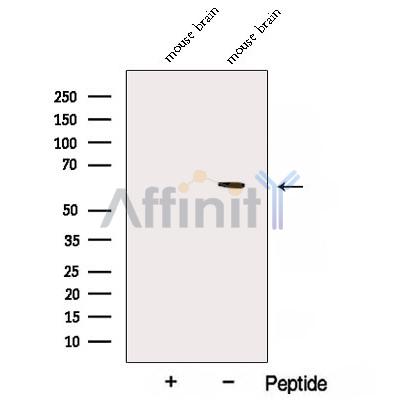APPBP1 Antibody - #DF12827
| Product: | APPBP1 Antibody |
| Catalog: | DF12827 |
| Description: | Rabbit polyclonal antibody to APPBP1 |
| Application: | WB |
| Reactivity: | Human, Mouse, Rat |
| Prediction: | Pig, Zebrafish, Bovine, Horse, Sheep, Rabbit, Dog, Chicken |
| Mol.Wt.: | 60 kDa; 60kD(Calculated). |
| Uniprot: | Q13564 |
| RRID: | AB_2845788 |
Related Downloads
Protocols
Product Info
*The optimal dilutions should be determined by the end user. For optimal experimental results, antibody reuse is not recommended.
*Tips:
WB: For western blot detection of denatured protein samples. IHC: For immunohistochemical detection of paraffin sections (IHC-p) or frozen sections (IHC-f) of tissue samples. IF/ICC: For immunofluorescence detection of cell samples. ELISA(peptide): For ELISA detection of antigenic peptide.
Cite Format: Affinity Biosciences Cat# DF12827, RRID:AB_2845788.
Fold/Unfold
59 kDa; A 116A10.1; Amyloid beta precursor protein binding protein 1 59kD; Amyloid beta precursor protein binding protein 1 59kDa; Amyloid beta precursor protein binding protein 1; Amyloid beta precursor protein binding protein 1, 59 kDa; Amyloid beta precursor protein-binding protein 1; Amyloid protein binding protein 1; Amyloid protein-binding protein 1; APP BP1; APP-BP1; APPBP 1; APPBP1; HPP 1; HPP1; NAE 1; NAE1; NEDD8 activating enzyme E1 regulatory subunit; NEDD8 activating enzyme E1 subunit 1; NEDD8 activating enzyme E1 subunit; NEDD8-activating enzyme E1 regulatory subunit; Proto oncogene protein 1; Proto-oncogene protein 1; Protooncogene protein 1; ula 1; ULA1_HUMAN;
Immunogens
A synthesized peptide derived from human APPBP1, corresponding to a region within N-terminal amino acids.
- Q13564 ULA1_HUMAN:
- Protein BLAST With
- NCBI/
- ExPASy/
- Uniprot
MAQLGKLLKEQKYDRQLRLWGDHGQEALESAHVCLINATATGTEILKNLVLPGIGSFTIIDGNQVSGEDAGNNFFLQRSSIGKNRAEAAMEFLQELNSDVSGSFVEESPENLLDNDPSFFCRFTVVVATQLPESTSLRLADVLWNSQIPLLICRTYGLVGYMRIIIKEHPVIESHPDNALEDLRLDKPFPELREHFQSYDLDHMEKKDHSHTPWIVIIAKYLAQWYSETNGRIPKTYKEKEDFRDLIRQGILKNENGAPEDEENFEEAIKNVNTALNTTQIPSSIEDIFNDDRCINITKQTPSFWILARALKEFVAKEGQGNLPVRGTIPDMIADSGKYIKLQNVYREKAKKDAAAVGNHVAKLLQSIGQAPESISEKELKLLCSNSAFLRVVRCRSLAEEYGLDTINKDEIISSMDNPDNEIVLYLMLRAVDRFHKQQGRYPGVSNYQVEEDIGKLKSCLTGFLQEYGLSVMVKDDYVHEFCRYGAAEPHTIAAFLGGAAAQEVIKIITKQFVIFNNTYIYSGMSQTSATFQL
Predictions
Score>80(red) has high confidence and is suggested to be used for WB detection. *The prediction model is mainly based on the alignment of immunogen sequences, the results are for reference only, not as the basis of quality assurance.
High(score>80) Medium(80>score>50) Low(score<50) No confidence
Research Backgrounds
Regulatory subunit of the dimeric UBA3-NAE1 E1 enzyme. E1 activates NEDD8 by first adenylating its C-terminal glycine residue with ATP, thereafter linking this residue to the side chain of the catalytic cysteine, yielding a NEDD8-UBA3 thioester and free AMP. E1 finally transfers NEDD8 to the catalytic cysteine of UBE2M. Necessary for cell cycle progression through the S-M checkpoint. Overexpression of NAE1 causes apoptosis through deregulation of NEDD8 conjugation.
Ubiquitinated by TRIP12, leading to its degradation by the proteasome.
Cell membrane.
Note: Colocalizes with APP in lipid rafts.
Ubiquitous in fetal tissues. Expressed throughout the adult brain.
Belongs to the ubiquitin-activating E1 family. ULA1 subfamily.
Research Fields
· Human Diseases > Neurodegenerative diseases > Alzheimer's disease.
Restrictive clause
Affinity Biosciences tests all products strictly. Citations are provided as a resource for additional applications that have not been validated by Affinity Biosciences. Please choose the appropriate format for each application and consult Materials and Methods sections for additional details about the use of any product in these publications.
For Research Use Only.
Not for use in diagnostic or therapeutic procedures. Not for resale. Not for distribution without written consent. Affinity Biosciences will not be held responsible for patent infringement or other violations that may occur with the use of our products. Affinity Biosciences, Affinity Biosciences Logo and all other trademarks are the property of Affinity Biosciences LTD.


